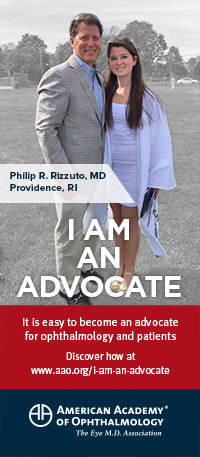 My association with Academy advocacy started simply -- when a colleague from my state society asked if I would like to participate in the Leadership Development Program, class of 2001.
My association with Academy advocacy started simply -- when a colleague from my state society asked if I would like to participate in the Leadership Development Program, class of 2001.
As a young ophthalmologist three years into practice, and with the deepest respect for the Academy, I was intrigued by my colleague’s invitation. I found the ensuing January trip to San Francisco and weekend meeting with my contemporaries very appealing.
What I’ve found truly fascinating are the opportunities that presented themselves after I completed the year-long program. I have been able to participate with my state society, including as its president; worked with the Academy Council as a councilor; and served on several Academy committees, including State Affairs (once state affairs always state affairs). I currently serve as the Secretary for Communication.
Advocacy, according to a quick Google search, is defined as “public support for or recommendation of a particular cause or policy.” By getting involved on a national, state and local level, I gained the tools needed to help my ophthalmology colleagues, my patients and myself.
A recent experience on a state level demonstrates how worthwhile I’ve found advocacy.
Recently, I testified at the state level in front of the Rhode Island House Judiciary Committee. Trial lawyers had introduced a bill in the legislature that would have required all ophthalmologists in the state to report to the Department of Motor Vehicles if a patient failed the vision test necessary for a driver’s license. If the ophthalmologist did not report this information, and the patient was subsequently involved in an accident, the doctor would be liable for the damages.
I know, I know, but it’s Rhode Island. The bill, as we all know, does not work on so many levels.
I immediately worked with my current state society president, contacted the Academy federal affairs staff in San Francisco and Washington, D.C., and worked with OMIC.
Together, we formulated a concise, poignant, directed testimony.
On my way into the hearing, I met the chief of staff of the Rhode Island House speaker, for whom I hosted an event for a few weeks earlier. When I discussed the bill and its lack of merit with him, he agreed to relay my concerns to the representatives. At the conclusion of my testimony, the bill’s sponsor came into the hallway and apologized for not speaking with organized medicine and working with them. The chief of staff agreed to revisit the sponsorship of the poor legislation.
Relationships matter! The bill has been held for further study. However, it is still Rhode Island; we will see how it works out.
I am an advocate for my family, myself, my patients and my colleagues. There is strength in numbers.
Working together, we can all make a difference. My state society, the Academy and OMIC have the resources, the staff and the know-how to help. We all need to get involved!
Philip R. Rizzuto, MD, is an oculoplastics specialist in Providence.